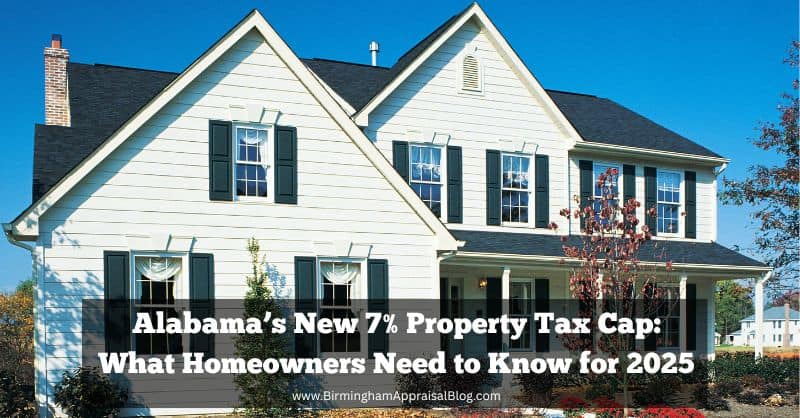A Closer Look at Alabama’s New 7% Property Tax Cap
If you’ve been hearing about Alabama’s new 7% property tax cap, you’re not alone. The recently passed House Bill 73 (Act 2024-344) has a lot of homeowners wondering what it really means and how it might impact their next tax bill.
In this post, I thought I would break it down in plain language and look at what the new law does, who it helps, and what to watch for when it comes time to pay your 2025 property taxes.
What the 7% Cap Really Means
The new cap limits how much a county tax assessor can increase a property’s assessed value in one year for properties that qualify.
Here’s what this actually means:
- Property taxes are based on assessed value, not market value.
- For most owner-occupied homes, assessed value is about 10% of the market value; however, this value can vary.
- Under the new rule, if your home’s market value rises quickly, the assessed value can’t increase more than 7% in a single year, as long as you qualify.
Example:
Suppose your home in Vestavia Hills was assessed at $500,000 last year, and the market value rose about 15% to $575,000. Without the cap, your assessed value would be the full $575,000. With the cap, it can increase only 7%, to around $535,000. That smaller jump helps keep your tax bill more reasonable from year to year.
Who Qualifies
The 7% cap applies to Class III property, which includes:
- Owner-occupied single-family homes (primary residences)
- Agricultural land
- Timberland
It does not apply to rental property, second homes, or commercial real estate.
If you purchased a new home this year, the county will establish a new base value when you bought the home, and the cap typically applies beginning in the next assessment cycle.
Why It Matters for 2025
Homeowners in both Jefferson and Shelby Counties have seen property values increase in recent years, particularly in areas like Hoover, Vestavia Hills, and Mountain Brook.
The cap will help keep future increases more gradual. Even if your home’s market value rises 15%, your assessed value can go up only 7%.
That means your tax bill should rise more slowly, assuming tax rates don’t change.
This will help smooth out big jumps and make it easier to budget for taxes since you will know what to expect.
Does This Mean Your Tax Bill Can Never Go Up by More Than 7%?
Not exactly. The cap controls how fast your assessed value can increase, not your overall tax bill.
Here’s what it doesn’t do:
- It doesn’t freeze your taxes completely. Your bill can still go up if your city or county raises the tax rate.
- It doesn’t limit value added by major improvements like room additions, finished basements, or new structures.
- It doesn’t automatically fix over-assessed properties. If your value was too high before, you still need to appeal.
So while the cap helps, it’s not a guarantee of lower taxes; it just slows the rate of increases.
How It Affects Jefferson & Shelby County Homeowners
Most property owners in these counties will see the impact starting with the 2025 tax year.
Because both counties review property values regularly, this new cap helps prevent large year-to-year variations in property taxes.
If your neighborhood experienced quick appreciation, you will notice the benefit first.
What You Should Watch Out For
Here are a few reminders to keep things in perspective:
- Millage rate changes: Even with the cap, a higher local tax rate can raise your total bill.
- Notice accuracy: Always double-check parcel numbers, ownership, and property class on your notice.
- Major improvements: Adding square footage or finishing a basement can trigger a reassessment that isn’t capped.
- Over-assessment: The cap won’t correct an inflated value from prior years, so you may want to consider an appeal.
What To Do If You Think Your Assessment is Still Too High
Even with the 7% limit, some homeowners may think that the assessment is still too high.
Here’s what you can do:
- Review your notice carefully. Make sure the address, parcel number, and class are correct.
- Compare with recent sales. Look at similar nearby home sales and focus on the size, age, and condition of the property since they can have a large impact on value.
- File an appeal if the assessment seems off.
Click HERE for a downloadable checklist.
Jefferson and Shelby Counties both post their appeal forms and instructions on their websites.
If you need step-by-step guidance, check out my article on how to appeal your property tax assessment.
And if you decide to appeal, a professional real estate appraisal gives you solid, independent evidence to support your case. I’ve helped many homeowners through that process by providing an accurate, well-supported appraisal.
Conclusion
The new Alabama 7% property tax cap can help prevent large swings in property taxes for homeowners. With a known fixed rate of increase, it can help to plan for what property taxes will be each year.
Still, it’s not a fix-all. The cap limits yearly increases, but you should still verify that your property’s assessed value is fair, that your county has accurate information, and that you understand your rights to appeal if needed.
If you believe your home is over-assessed or you just want to be sure your valuation makes sense, I can help.
I provide independent appraisals for homeowners and attorneys across Jefferson and Shelby Counties for property tax appeals, estates, divorce cases, probate, and other non-lender needs.
Feel free to contact me if you have any questions or need an appraisal, and as always, thanks for reading.

Speak Your Mind